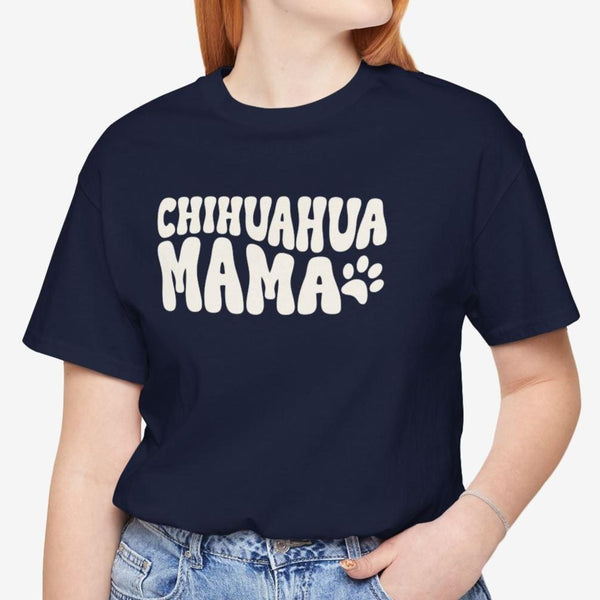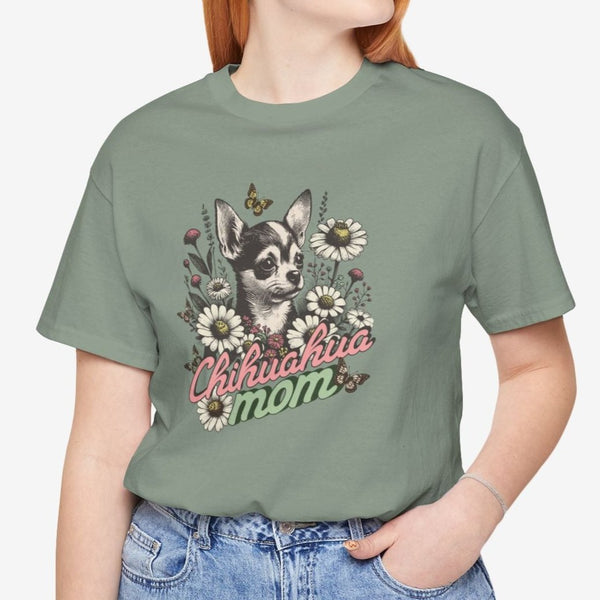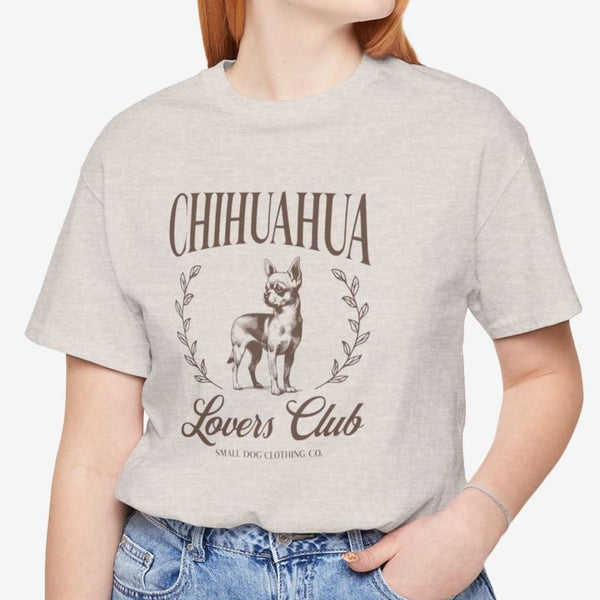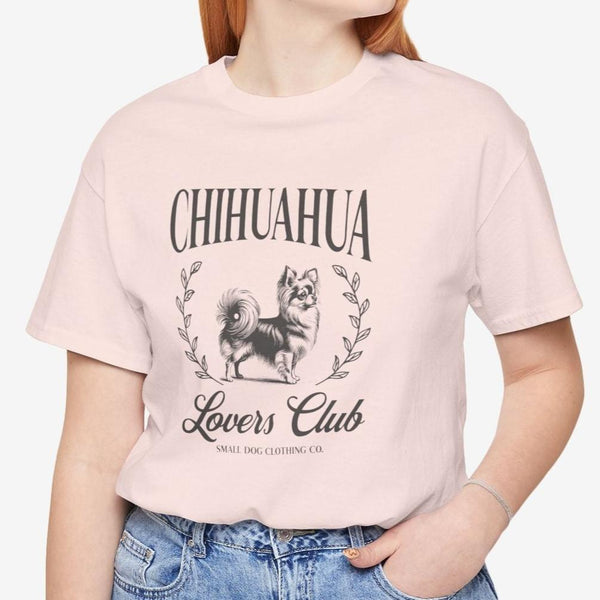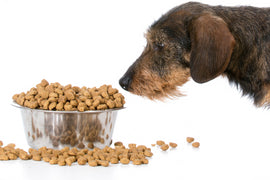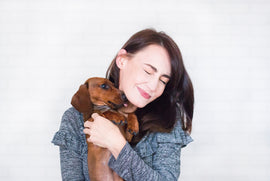Why Is My Chihuahua Shaking? A Guide for Dog Owners
Posted by ROBERTO BURALLI

Chihuahuas are beloved companions known for their big personalities and small statures. One quirky characteristic that often puzzles new Chihuahua owners is their tendency to shake and tremble. While this behavior can be concerning at first glance, it's often a normal part of being a Chihuahua.
In this article, we'll explore the common reasons behind those little quivers, discuss when shaking is considered normal, and provide tips for calming your tiny companion's trembles.
By understanding the underlying causes of Chihuahua shaking, you can better support your pup's health and happiness.
Is Shaking Normal for Chihuahuas?
If you're a Chihuahua owner, you've likely noticed your pup's adorable little shudders. But is all that shaking and quivering normal?
The short answer: yes, it's perfectly natural for most Chihuahuas to tremble to some degree.
Chihuahuas are inherently prone to shaking due to their small size, high metabolisms, and low body fat, which make them sensitive to feeling chilly. Those quivers are their way of generating warmth. Moreover, this breed's big personalities often come with intense emotions like anxiety and excitement, which can manifest as full-body tremors.
However, the extent of shaking varies among individual Chihuahuas based on factors such as temperament, environment, health, and genetics. More anxious or nervous Chis may shake more often when stressed or overstimulated.
While some shaking is normal, excessive or uncontrollable quivering, especially when accompanied by other concerning symptoms like lethargy or loss of appetite, could indicate an underlying medical issue requiring veterinary attention.
In summary, those adorable little quivers are part of what makes Chihuahuas so unique. Stay attuned to your dog's shaking patterns, and you'll know when they fall within the normal range or if it's time to consult your vet.

Those Little Quivers: Common Reasons Chihuahuas Shake
While it may seem concerning at first, those little quivers are often perfectly normal for this breed. Let's explore five common reasons behind the shaky Chihuahua.
Keeping Warm
With their miniature size and minimal body fat, Chihuahuas can have a hard time retaining body heat. Shivering is nature's way of helping them generate warmth when they feel chilly. If your pup seems cold, providing a cozy sweater or heated bed can help stop those thermoregulatory trembles.
Emotional Overload
Chihuahuas experience emotions as intensely as they experience life itself. Those full-body quivers could be your Chi's way of expressing excitement, anxiety, or even fear. Pay attention to context clues like tail wagging versus hiding to decode if those shakes are coming from a positive or negative emotional place.
Pent-Up Energy
Don't let their small stature fool you - Chihuahuas are tiny bundles of energetic enthusiasm! If they don't get enough daily exercise and playtime to burn off that vigor, they may start quivering with stored energy and stimulation. A good romp can help release those pent-up zoomies.
Unseen Health Woes
While often innocuous, excessive or unexplained shaking can sometimes indicate an underlying medical issue like pain, injury, or illness in Chihuahuas. If the quivering seems abnormal or severe, it's wise to have your veterinarian examine your pup to identify or rule out any health problems.
Low Blood Sugar
Chihuahuas are prone to hypoglycemia (low blood sugar) due to their sky-high metabolisms. Shaking and trembling can signal a hypoglycemic episode, often accompanied by weakness or disorientation. Preventing this with scheduled small meals is important for keeping their sugar levels stable.

Calming Those Tiny Trembles: Tips for Chihuahua Owners
As adorable as those little Chihuahua quivers can be, excessive shaking may sometimes require some intervention from an attentive dog parent. If your mighty mutt seems plagued by persistent tremors, don't fret - there are several strategies you can try to help soothe those shakes.
Create a Cozy Haven
For stress or anxiety-induced shakes, provide your Chi with a secure, den-like nook they can retreat to when overwhelmed. Outfit their special space with a comfy bed, favorite blankets, and calming accessories like pheromone diffusers or white noise. Making your pup feel safe can go a long way towards alleviating those nervous jitters.
Get That Energy Out
Chihuahuas are energetic little pups, so ensuring your dog gets enough daily exercise is key to burning off any excess stimulation that could manifest as trembling. Take them on walks, play vigorous games, or even look into dog sports to positively channel that vigor.
Manage Anxiety Naturally
Several natural approaches may help ease general anxiety. Make sure your Chi's diet is balanced and consider supplements like calming herbs or pheromones under your vet's guidance. Creating a predictable routine and desensitizing them to potential triggers through positive reinforcement training can also minimize stress.
Keep Them Cozy
Don't underestimate the cold! Since Chihuahuas are prone to feeling chilly, shaking may simply be their bodies' way of generating warmth. Provide plenty of warm sleeping areas with thermal dog beds or sweaters to allow your pup to stay toasty.

When Those Chihuahua Quivers Raise Concerns
For Chihuahua owners, those adorable little quivering episodes are simply part of the breed's charm. But there are times when the shakes demand more than an indulgent smile.
As a responsible pet parent, you'll want to learn when those trembles potentially signal something more serious brewing under that furry exterior.
When to Call the Vet
If the shaking seems extreme, uncontrolled, or accompanied by other red flags like fatigue or reduced appetite, it's wise to have your veterinarian examine your pint-sized pup.
They can properly evaluate for underlying medical triggers like low blood sugar and recommend any needed treatment. With some adjustments and close monitoring, most excessive shaking can be managed.
Potential Shaking Red Flags
Relentless Tremors: Nearly continuous, intense quivering that doesn't let up is far from normal Chihuahua behavior. Those unrelenting, full-body trembles could indicate distress.
Odd Symptom Combinations: Shaking paired with other concerning signs like vomiting, labored breathing, or lethargy deserves medical attention to identify any underlying condition.
Demeanor Changes: If the shakes coincide with new behavioral oddities like aggression, confusion, or a refusal to move around, it could stem from pain, trauma, or neurological issues.
Post-Accident Shakes: Any quivering following an injury, fall, or altercation with another animal merits a vet check to evaluate for internal trauma.
Anxiety Overload: While some situational shaking is expected for anxious Chihuahuas, if your pup seems plagued by severe, constant anxiety no matter what, unrelenting trembles could be a manifestation requiring treatment.
Shakes Without Cause: Bouts of quivering that appear entirely disconnected from any triggers like temperature, stress, or pent-up energy are considered suspicious.
If you notice any of these shaking patterns or accompanying red flags, it's better to be safe than sorry. Give your vet a call and describe the situation - they can advise if your pup needs an examination or not.
With Chihuahuas, excessive shaking can sometimes indicate bigger health problems, so staying alert and acting decisively is important.
Related Post: Understanding Chihuahua Temperament and Personality: A Guide for Prospective Owners

Conclusion
Shaking is a common and often normal behavior in Chihuahuas, stemming from a variety of factors such as their small size, high metabolism, and emotional sensitivity.
As a Chihuahua owner, it's important to understand the reasons behind your pup's quivers and take steps to minimize any excessive trembling. By providing a cozy environment, managing anxiety, ensuring proper exercise, and keeping them warm, you can help your Chihuahua feel more calm and secure.
However, it's crucial to stay alert for any shaking red flags or accompanying symptoms that may indicate a more serious underlying issue. If you notice any concerning changes in your Chihuahua's shaking patterns or overall health, don't hesitate to consult with your veterinarian for guidance.
With a little knowledge, attentiveness, and care, you can help your tiny titan thrive and shake off any worries.
SHARE:





